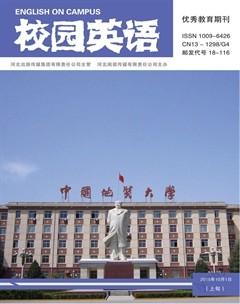论丘吉尔的《关于希特勒入侵(前)苏联的演说》
万兴
【摘要】丘吉尔的这篇演说中的语言雄壮豪迈,极富说服力,在其当时紧迫的情势下,说服人们抛弃不同的政治制度和思维方式建立了广泛的世界统一战线,抵制纳粹政权。成为了一篇成功的政治演讲稿,同时也是一篇具有文学价值的语篇。
【关键词】人称用法 修辞手法 外语学习
一、多种人称交叉使用
1.第一人称的使用
(1)单数第一人称的使用:I(16次)、Me(1次)。第一人称单数往往给人的感觉就是比较主观、比较个人化,感觉都是表达的个人的观点,在一般的政治演讲中政客们都不会采用。而相反,丘吉尔却采用了这种常人不会用的人称,恰恰相反,使他的演讲更加有力度。毫无疑问,单数第一人称单称代表的是丘吉尔自己。在这篇演说中,单一的使用最大的作用就是突出丘吉尔自己首相的身份,使其所说的话更有分量,更有力量,从而为后面号召英国人民甚至全世界做铺垫。a.I see the Russian soldiers standing on the threshold of their of their native land,guarding the fields which their fathers have tilled from time immemorial,I see them guarding their homes where mothers and wives pray-all,yes,for there are times when all pray-for their loved ones,the return of the bread-winner,of their champion,of their protector.I see the ten thousand villages of Russia where the means of existence is wrung so hardly from the soil,but where there are still primordial human joys,where maidens laugh and children play.I see advancing upon all this in hideous onslaught the Nazi war machine,with its clanking,heel-clicking,dandified Prussian officers,its craft expert agents fresh from the cowing and tying down of a dozen countries.I see also the drilled,docile,brutish masses of Hun soldiery plodding on like a swarm of crawling locusts.I see the German bombers and fighters flying in the sky,still smarting from many a British whipping,delighted to find what they believe is an easier and safer prey.b.I have to declare the decision of His Majestys Government-and I feel sure it is a decision in which the Great Dominions will in due course concur-for we must speak out now at once,without a days delay.I have to make the declaration……a句和b句都是丘吉尔用自己首相身份的号召力来号召全民。中五个“I see”本身用的是第一人称I,听者听到的仿佛是丘吉尔自己亲眼看到的,看到前苏联人民正在经历的一切。正是因为丘吉尔采用的I,用自己首相的权威身份使其写出来的(即使没有看到的)显得逼真,让全国上下更深切的感受苏联人民做遭受的一切并对这一切产生同情,因此更有说服力。
(2)复数第一人称的使用:We(17次)、Us(3次)Our(12次)。第一人称复数是政治演讲常常采用的人称,是因其可以将演讲人本身与听众融合在一起,让听众感觉演讲者与自己是一类人,更有号召力。同样,丘吉尔也采用了这种方式。
a.…… We have but one aim and one single,irrevocable purpose.We are resolved to destroy Hitler and every vestige of the Nazi Regime.From this nothing will turn us-nothing.We will never parley,we will never negotiate with Hitler and any of his gang.We shall fight him by land,we shall fight him by see,we shall fight him in the air,until,with Gods help,we have rid the earth of its shadow and liberated its people from his yoke.Any man or state who fight on against Nazidom will have our aid.Any man or state who marches on with Hitler is our foe……That is our policy and that is our declaration.It follows therefore that we shall give whatever help we can to Russia and Russian people.We shall appeal to all our friends and allies in every part of the world to take the same course and pursue it,as we shall faithfully and steadfastly to the end……b.……On the contrary,we shall be fortified and encouraged in our efforts to rescue mankind from his tyranny.We shall be strengthened and not weakened in determination and in resources.a句中丘吉尔采用第一人称复数“We”“our”“us”将自己融合进去,表现这不仅是他一个人的决定,一个人的目标,而是所有人的。接着在写到什么是policy和declaration时,表现了丘吉尔的决心,他们的目标只有也仅有一个,那就是消灭希特勒的纳粹政权。b句中表现了不管希特勒怎样,一个we 体现了丘吉尔都将与全人类站在一起。正是这样,他将自己与英国人民与前苏联人民乃至全世界人民放在一起,呼吁全人类反抗纳粹政权,同时也大大的鼓舞了苏联人民和全世界人民的鼓舞。
2.第三人称的使用。在演讲中一般使用第三人称的时候都是指除自己以外或不想包含在内的人或者是事物。就像丘吉尔在此篇演讲中一样,用第三人称来体现自己与苏联与希特勒的关系。
(1)单数第三人称的使用:He(12次)Him(11次)His(13次)It(4次)Its(6次)丘吉尔用he或him指代希特勒,而用it或是its指代纳粹政权。从而与自己疏远。
(2)复数第三人称的使用:Their(5次)Them(1次)Themselves(1次)丘吉尔本人作为反共的大人物,毫无疑问即使是在这种情况下,也不会放弃自己的政治态度,所以他巧妙地用第三人称复数形式来区分他与前苏联这个最大的共产主义国家的关系,不在像前面他所采用的第一人称那样,而是刻意去疏远又不乏不妥。
3.第二人称的使用:You(1次)。整篇演讲中,我们能够寻到的只有一处。You没有第一人称那样被演讲者视为一部分,有时是指演讲者所在其中的哪一类人,有时又被演讲者除外。而在这里,丘吉尔所指的是后者。“……I have to make the declaration,but can you doubt what our policy will be……”从丘吉尔所给我们呈现的上下文中,我们可以知道,丘吉尔善于用第一人称复数来体现与他政见一样的人,既然政见一致就不会不知道丘吉尔所谓的政策是什么,所以丘吉尔巧妙地又采用第二人称将自己与一些与自己政见不合的英国子民。 总之,丘吉尔采用不同的人称,将自己与苏联人民与丘吉尔以及它所代表的纳粹政权区分开,用不同的人称表达不一样的态度。丘吉尔做到了,并达到了效果。
二、修辞的采用
1.排比(Parallelism)。在《关于希特勒入侵(前)苏联演讲》中,排比随处可见,用法精湛。使得语言更加的简洁、语气更加的有力、语言的烘托力也更强。
2.重复(Repetition)。重复也是演讲中常用的一种修辞手法,反复提到一件东西用来强调其影响、作用。而丘吉尔在演讲中运用了这种修辞,引起了人们的认同。a.“We have but one aim and one single,irrevocable purpose.”中aim 和purpose都有目标的意思,而丘吉尔在这里重复不是显示他有多广的词汇,而是强调了丘吉尔剿灭希特勒的决心,同时也让我们感受到了信心,给人们以一种不仅要这样做而且能够做到的信心,大大的鼓舞了听众们。b.“……that process of destroying his enemies one by one which he has so long thrived and prospered,and……”thrived 和prospered都有繁荣的意思,而丘吉尔在这里强调无非是要讽刺希特勒的胜利是建立在血腥,建立在人类的痛苦之上的。给人们一呼吁,提醒,呼吁与他一起的人如果不消灭希特勒,消灭纳粹,那么他就会继续繁荣。
三、情态动词的使用
1.shall的运用。根据语法书上解释,shall有“意愿,意图和决心”的用法。而丘吉尔这篇演讲中对shall的使用体现了这种用法。
a.“We shall fight him by land,we shall fight him by see,we shall fight him in the air……It follows therefore that we shall give whatever help we can to Russia and Russian people.We shall appeal to all our friends and allies in every part of the world to take the same course and pursue it,as we shall faithfully and steadfastly to the end………”
b.“……On the contrary,we shall be fortified and encouraged in our efforts to rescue mankind from his tyranny.We shall be strengthened and not weakened in determination and in resources.”这些句子中多个shall更坚定了丘吉尔想消灭,想击败希特勒的纳粹政权的意愿。
2.must 和have to 的运用。两者在表示必须时,意义上很接近,但在用法上却不一样,“must”侧重于个人的主观意志,而“have to”则侧重客观需要。
a.“I have to declare the decision of His Majestys……”
b.“……I have to make the declaration……”
c.“……which he knows he must conquer or suffer the panalty of his crimes.”
d.“……for we must speak out now at once,without a days delay.”
a、b两句表现了丘吉尔对客观情况的了解,用客观事实来说服听众们,现在德国纳粹在向苏联人民进攻,但不久就会朝向我们的事实,情况的紧迫,用“have to”而不用“must”更有说服力。同样c句中,must的运用体现了希特勒想征服苏联、征服全世界的主观想法。丘吉尔巧妙地借此表达了希特勒的想法只是梦,不可能实现。
参考文献:
[1]张汉熙.高级英语(第一册)[M].修订版[M].北京:外语教学与研究出版社.1995.
[2]陈丽萍.政治演讲语篇人称代词的人际功能探讨[J].广东:茂名学院学报.2010.

